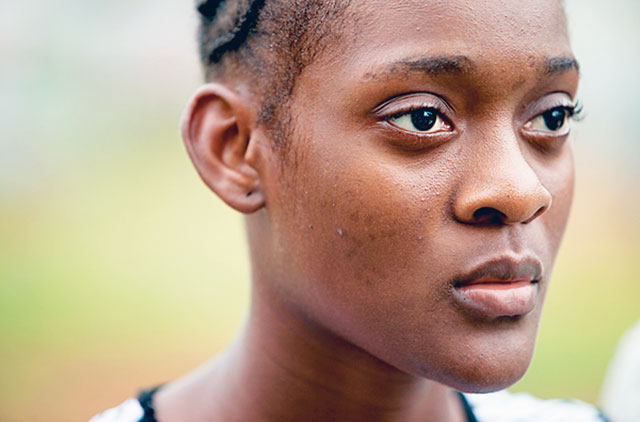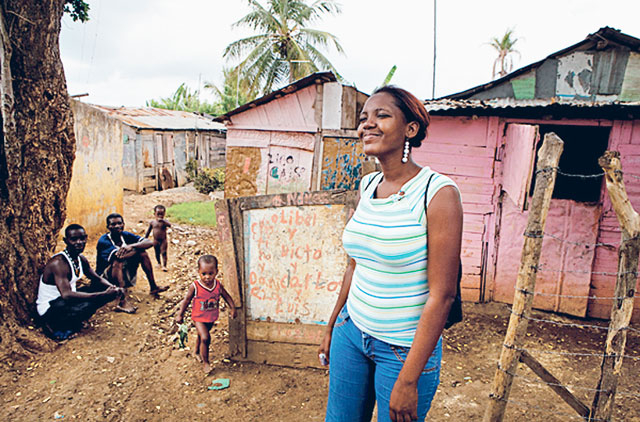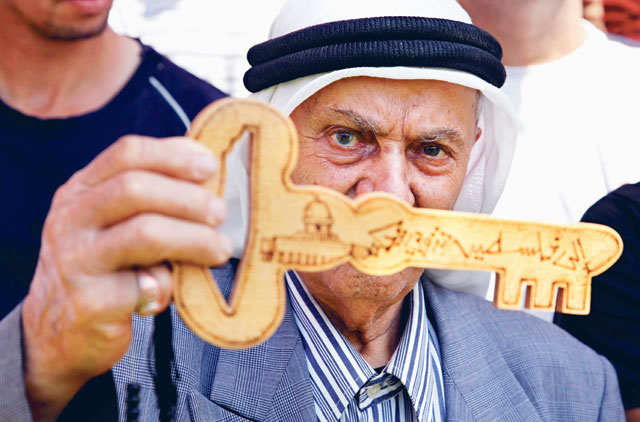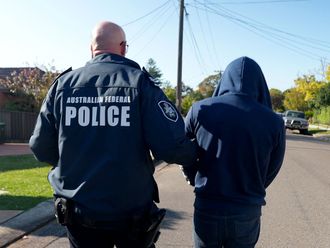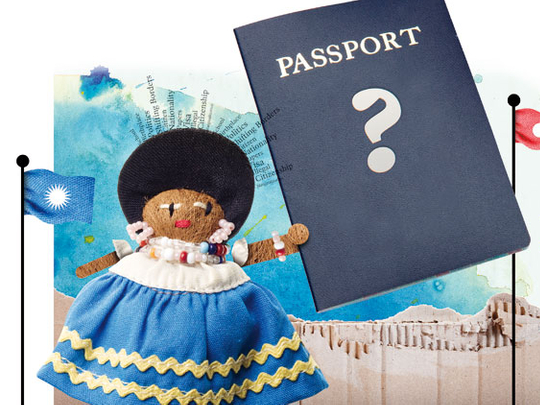
Until she graduated from high school, Sonia Camilise never had reason to question her nationality. She was born in the Dominican Republic and grew up speaking Spanish, dancing merengue and watching boys play baseball in the grassy lot outside her family's small house.
"I am Dominican," she says. "Of course."
But two years ago, when she went to get a copy of her birth certificate — a necessary part of the college application process in the Dominican Republic — she discovered that her government had a different perspective.
The civil registry officers told her she was not Dominican but Haitian. Their reasoning: Camilise did not have the papers to show that her father, a Haitian immigrant, had legal residency in the Dominican Republic when she was born.
It was a shock, she says. Her government was rejecting her — part of a new policy that Dominican officials say is necessary to combat illegal immigration.
But Haiti doesn't accept Camilise either. She has never been to Haiti. She has a Dominican birth certificate and national ID and even her mother was born in the Dominican Republic.
She doesn't speak Creole or French, the languages of Haiti. To Haiti, whose laws say that people who have chosen other nationalities cannot be Haitian, Camilise is Dominican.
So Camilise is stuck. She is unable to go to university or land a job legally, unable to even get a passport that would let her leave the country and try somewhere else. She is, in the lingo of human rights activists and international organisations, "stateless".
Camilise is far from alone in her predicament. The United Nations estimates that nearly 12 million people around the world are stateless. International advocacy groups have different motives for the new focus on the problem.
Some became conscious of the issue after the September 11 attacks, when they started looking at how non-citizens were affected by the so-called war on terror. Other organisations began focusing on statelessness as part of a broader intellectual trend of exploring the powers and limits of the nation state.
"People who are stateless have no life," says Maureen Lynch, the senior advocate for statelessness initiatives at Refugees International, an organisation at the forefront of raising awareness about the problem. "It's like you are standing still and the world moves on around you. It leads to human insecurity."
The stateless live in all parts of the globe, from Europe to South East Asia to the Caribbean — and even in the United States. If the state is the instrument that protects and ensures rights, those who live without a nationality are completely vulnerable.
Earlier this year, the UN Refugee Agency UNHCR announced that it was "redoubling" its efforts to combat statelessness, saying the predicament "impacts not only the individuals concerned but also society, in particular because excluding an entire sector of the population may create social tension and impair efforts to promote economic aid and social development".
Some countries have also taken steps to reduce statelessness within their borders. Although there are still barriers to citizenship, Nepal, for instance, recently provided documentation to thousands of people — some of the millions who had been unable to obtain citizenship rights because of a change in law requiring people to prove "Nepali origin", a phrase that was applied differently in different regions and did not consider a mother's nationality.
Bangladesh has started extending citizenship to some of the Bihari people, who, for years, have been rejected by both Pakistan and Bangladesh — a casualty of the division between East and West Pakistan in 1971.
In May, the US Senate Judiciary Committee held hearings on a Bill that would help the 4,000 or so stateless people within the US, suggesting new mechanisms for them to acquire green cards.
"The good news is that statelessness can be ended," Lynch says. It may be difficult to find one blanket approach, she says, but adjustments in laws and bureaucratic policy will fix much of the problem.
In Europe, the Roma — known derisively as gypsies — often lack identity documents. In Kenya, according to Human Rights Watch, more than 100,000 ethnic Nubians, whose forebears were brought there from Sudan by British colonialists in the late 19th and early 20th centuries to act as soldiers, have long been denied Kenyan citizenship.
Although the situation is starting to change, Nubians cannot acquire identity documents or work in the formal sector and inhabit large swaths of some of Nairobi's poorest slums.
In Kuwait, the government denies citizenship to what Refugees International estimate to be 120,000 Bedouin people (descendants of nomadic Bedouins who either didn't claim or weren't granted citizenship at the time national borders were drawn); in Syria, approximately 300,000 Kurds do not have citizenship. Palestinians are perhaps the best-known group who have suffered a similar treatment.
In the US, many of the estimated 4,000 stateless are failed asylum seekers or were visiting the US when their home country collapsed, according to Senate staffers who have worked on the issue.
"Mapping" statelessness — gathering statistics on not only how many people lack citizenship but also on their regions, the reasons for their statelessness and their family histories — is a key part of UNHCR's new strategy of increasing its effort to focus on stateless people.
The concept of statelessness first attracted widespread international attention in the aftermath of the Second World War, when the population of Europe was in flux.
The experience of the Jews, who had been denationalised by Germany's Nuremberg laws, along with the postwar border shifting, prompted the UN General Assembly to include the right to nationality in its 1948 Universal Declaration of Human Rights.
More proclamations followed. In 1954, the UN adopted the Convention Related to the Status of Stateless Persons, which attempted to outline rights for those who had no fixed nationality.
Seven years later, the UN adopted the Convention on the Reduction of Statelessness, which took measures such as allowing nationality to pass from mother to child and forbidding countries in most cases from denationalising citizens.
But these conventions carried little weight and the attention fizzled. Only 33 countries ratified the 1961 convention. It was a tricky issue. No country wants to give up the power to decide who should be a citizen, those working with statelessness acknowledge; in many ways, the ability to exclude people, to draw lines between "us" and "them" is at the heart of the concept of the nation state.
"In many ways, nationality is the last bastion of the sovereign-state doctrine," says James Goldston, executive director of the Open Society Institute's Justice Initiative, which now focuses on statelessness as one of its main advocacy issues.
"Article 15 of the Universal Declaration of Human Rights says that everyone has the right to nationality but nowhere does it say which state must secure that right. We still need some greater clarification of states' obligations."
The question is compounded, he says, by the different histories and characteristics of stateless people.
The Dominican Republic shows the hyperlocal aspect of the question, along with the common threads of marginalisation.
Here, statelessness revolves around the troubled relationship between the Dominican Republic and its poorer neighbour, Haiti. The history of these two countries, which share the island of Hispaniola, is fraught.
The Dominican Republic celebrates its independence from Haiti; Haitians remember how, in 1937, the Dominican dictator Rafael Trujillo massacred 30,000 of their countrymen living along the border.
Today, the Dominican government estimates that thousands of Haitian immigrants enter their country illegally each year — with the number increasing dramatically since January's devastating earthquake in Port-au-Prince.
At the same time, the Dominican economy depends on cheap Haitian labour to help the sugar, tourist and construction industries. Haitians and Haitian descendants who live in the Dominican Republic often talk about severe racism and mistreatment; Dominicans talk about how Haitians take jobs and tap already-strained public resources.
Until this year, the Dominican Constitution said that a child was a Dominican citizen if he or she had Dominican parents or was born on Dominican soil. There were two exceptions — the children of diplomats and the children of people "in transit".
For years, "in transit" meant someone docking in the country's port on a ship or stopping for a few days' visit. But in the past decade, the courts have changed this description to include migrants — even those who came with valid work permits. This year, the government passed a new Constitution that said children of illegal immigrants were not citizens.
This has consequences for education (teenagers can't go to college), health care (HIV rates in the bateyes are among the worst in the western hemisphere and activists worry about access to medicine) and poverty levels (without documents, a person can't be legally employed). Some also worry about an increase in human trafficking and prostitution.
Altagracia José, who was born in the Dominican Republic, points to her teenage daughter, who is pregnant, and says that the girl had to leave school because she had no papers.
"You know what happens to a young girl who is pregnant — if she can't go to school, she gets a man," she says. "And then another man."
José says that now she, too, cannot get copies of her papers, which keeps her from obtaining legal employment.
"I cried when they told me I was not Dominican," she says. "I cannot choose another country. I've never been to Haiti. If I am stateless, I am nobody."
Travel for this article was funded by a grant from the Pulitzer Centre on Crisis Reporting.


